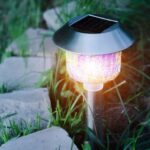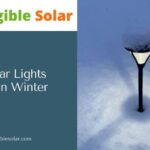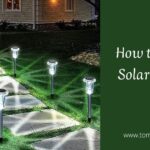Why are My Solar Lights Dim? Unveiling the Power Struggle
The solar lights may be dim due to several reasons, such as a lack of direct sunlight, a dirty solar panel, or a dying battery. Solar lights have gained popularity as an eco-friendly and cost-effective lighting solution for outdoor spaces.
However, there may be instances when you find your solar lights providing insufficient illumination. Wondering why your solar lights are dim? Well, several factors can contribute to this issue. We will explore some common reasons why your solar lights may seem dim and provide you with practical solutions to brighten up your outdoor area effectively.
Whether it’s an inadequate amount of sunlight, a dirty solar panel, or a weak battery, understanding these potential culprits will help you optimize the performance of your solar lights and enjoy brighter and more efficient illumination.
Understanding Solar Lights And Their Purpose
Solar lights have become increasingly popular for outdoor illumination due to their eco-friendly nature and cost-saving benefits. These lights harness the power of the sun to provide light during the night, allowing for a sustainable and efficient alternative to traditional electricity-powered lights. However, at times, you may notice that your solar lights appear dimmer than usual. In this section, we will delve into what solar lights are and how they work, the benefits of using solar lights for outdoor lighting, and the importance of proper maintenance for optimal performance.
What Are Solar Lights, and How Do They Work?
Solar lights are lighting fixtures equipped with photovoltaic panels, which convert sunlight into electrical energy. This energy is stored in rechargeable batteries for use when the sun sets. Solar lights commonly consist of several components, including:
- Photovoltaic panel: This panel captures sunlight and converts it into electricity.
- Rechargeable battery: The battery stores the electrical energy that the panel produces for later use.
- LED bulbs: These energy-efficient bulbs emit light when the battery powers them.
- Sensor or controller: The sensor detects the absence of light, prompting the solar light to turn on automatically.
Why Do My Solar Lights Turn Off At Night
During the day, the photovoltaic panel absorbs sunlight, converting it into electrical energy. This energy charges the battery, which stores the electricity until it is needed. When the light sensor detects darkness, typically in the evening, it signals the solar light to turn on. The stored electricity powers the LED bulbs, providing illumination throughout the night. It’s essential to position solar lights in areas that receive ample sunlight during the day to ensure optimal charging of the battery.
Benefits Of Using Solar Lights For Outdoor Illumination
There are several advantages to using solar lights for outdoor lighting needs:
- Energy-efficiency: Solar lights are powered by renewable energy from the sun, reducing your carbon footprint and lowering electricity costs.
- Cost-effectiveness: Once installed, solar lights operate without recurring monthly expenses, making them a cost-effective lighting solution in the long run.
- Easy installation: Solar lights require minimal installation efforts since they do not rely on complicated wiring or access to electricity grids.
- Enhanced safety: Solar lights improve safety by illuminating pathways, driveways, and outdoor spaces, preventing accidents and deterring potential intruders.
- Versatility: Solar lights are available in various designs, sizes, and functionalities, allowing you to choose the ones that suit your specific outdoor lighting requirements.
The Importance Of Proper Maintenance For Optimal Performance
To ensure that your solar lights are operating at their highest efficiency and providing optimal illumination, proper maintenance is crucial. Here are a few maintenance tips to follow:
- Regular cleaning: Keep the photovoltaic panel clean and free from dust or debris to maximize its ability to absorb sunlight.
- Check for shading: Ensure that your solar lights are not obstructed by objects that could cast shadows, as shading reduces their ability to charge the battery effectively.
- Inspect batteries: Routinely check the rechargeable batteries and replace them if they become worn out or no longer hold a charge.
- Adjust the positioning: If you notice dimness in your solar lights, consider repositioning them to receive more direct sunlight.
- Replace faulty components: If any part of your solar lights malfunctions, such as the bulbs or sensors, replace them promptly to maintain optimal performance.
By adhering to these maintenance practices, you can ensure that your solar lights remain bright and reliable, enhancing your outdoor space with eco-friendly illumination.
Common Causes Of Dim Solar Lights?
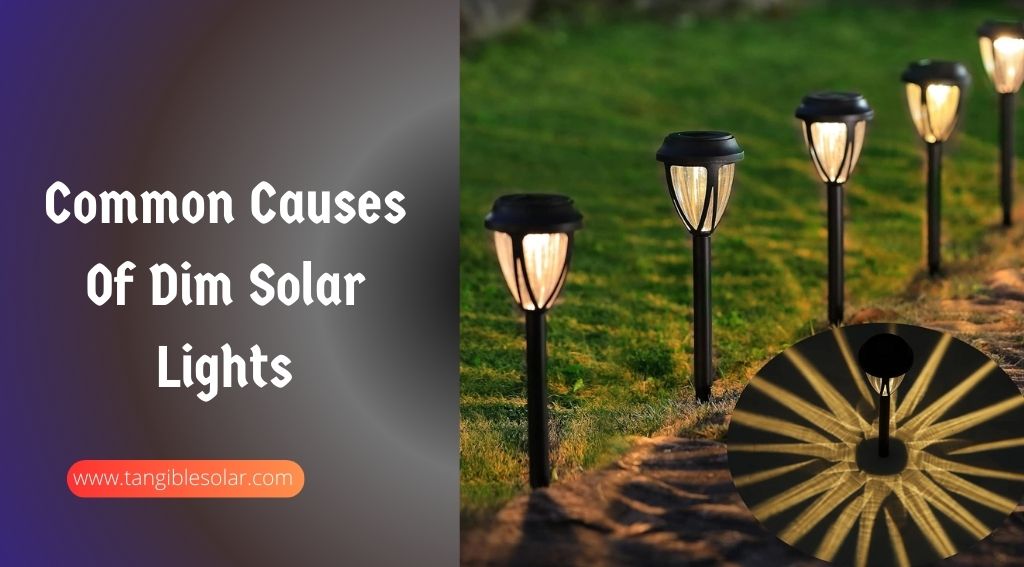
If your solar lights are not shining as brightly as they used to, there could be several common causes for this dimness. Understanding the potential culprits behind the reduced brightness of your solar lights is the first step toward finding an effective solution. Below, we explore the most frequent reasons why solar lights may appear dim and provide you with practical tips to resolve the issue.
Lack Of Direct Sunlight Exposure
One of the most common causes of dim solar lights is a lack of direct sunlight exposure. Solar lights rely on sunlight to charge their batteries and convert that energy into illumination. If your lights are located in a shaded area or are obstructed by trees, buildings, or other objects, they may not receive sufficient sunlight to fully charge. This can result in dimmer light output during nighttime.
Dirty Solar Panels Affecting Energy Absorption
Dirty or dusty solar panels can significantly impact the energy absorption of your solar lights. When dust, debris, or grime accumulates on the surface of the panels, it limits their ability to absorb sunlight effectively. As a result, less energy is converted into usable power, leading to dimmer lights. Regular cleaning and maintenance of the solar panels can help improve their efficiency and restore the brightness of your solar lights.
damaged Or Defective Batteries
The batteries in your solar lights play a crucial role in storing energy and powering the LEDs. Over time, batteries can become damaged or wear out, resulting in reduced capacity and diminished light output. Additionally, extreme temperatures can affect the performance of batteries. If your solar lights appear dim, checking the battery health and replacing any faulty batteries can often solve the problem and restore the brightness of your lights.
Faulty Or Outdated Leds
The LEDs (light-emitting diodes) used in solar lights can also be responsible for dimness. If the LEDs are damaged, have exceeded their lifespan, or are outdated technology, they may produce weaker illumination. Inspecting the LEDs and replacing any faulty or outdated ones can help optimize the brightness of your solar lights.
Poor Positioning Of The Solar Lights
The positioning of your solar lights is vital in ensuring optimal exposure to sunlight. If the lights are placed in shaded or partially shaded areas, their ability to absorb sunlight is compromised, resulting in diminished brightness. Properly positioning your solar lights in areas where they receive direct sunlight for most of the day can significantly improve their performance and brightness.
By addressing these common causes of dim solar lights, you can enhance their brightness and ensure they function at their best. Regular cleaning, maintaining optimal battery health, checking and updating LEDs, and correct positioning are all essential steps in keeping your solar lights shining bright.
Troubleshooting And Solutions For Dim Solar Lights
Are your solar lights not shining as brightly as they used to? Dim solar lights can be frustrating, but before you rush to replace them, there are a few troubleshooting steps you can take to identify and resolve the issue. In this article, we will explore some common reasons why solar lights may be dim, along with practical solutions to help you restore their brightness and functionality.
Assessing The Solar Panel Placement For Proper Sunlight Exposure
One of the primary factors that can contribute to dim solar lights is incorrect solar panel placement. Solar panels rely on direct exposure to sunlight to generate energy. If the panels are not positioned optimally, they may receive insufficient sunlight, resulting in dim lighting. To assess the solar panel placement, follow these steps:
- Observe the solar lights throughout the day, noting if any surrounding objects or structures cast shadows on the panels.
- Ensure that the solar panels are oriented towards the south for maximum sunlight exposure, assuming you are in the northern hemisphere. For those in the southern hemisphere, panels should face north.
- Check if there are any obstructions, such as tree branches, that block the sun’s rays from reaching the solar panels. Trim any overhanging branches to allow for better exposure.
By carefully assessing the placement of your solar panels, you can ensure they receive adequate sunlight and maximize their energy conversion efficiency.
Cleaning The Solar Panels To Improve Energy Absorption
Over time, dirt, dust, and debris can accumulate on the surface of solar panels, obstructing the absorption of sunlight and diminishing their effectiveness. Cleaning the solar panels is a simple yet essential maintenance task that can help restore their energy absorption capacity. Follow these cleaning guidelines:
- Gently remove any loose debris or dirt from the surface of the solar panels using a soft, dry cloth.
- Prepare a solution of mild soap and water, and use a non-abrasive sponge or cloth to wipe down the solar panels.
- Rinse the panels with clean water and allow them to air dry.
- Repeat this cleaning process periodically, especially if you notice a significant decrease in the brightness of your solar lights.
Regular cleaning of the solar panels will ensure they remain free from dirt and grime, maximizing their efficiency in absorbing sunlight and generating power.
Replacing Or Recharging The Batteries For Better Performance
Solar lights rely on rechargeable batteries to store the energy collected during the day and power the lights at night. If the batteries are old or depleted, they may struggle to hold a charge, resulting in dim lighting. To address this issue, you can follow these steps:
- Identify the type of batteries used in your solar lights. Common types include AAA, AA, or lithium-ion batteries.
- If the batteries are rechargeable, ensure they are fully charged before inserting them back into the solar lights.
- If the batteries are non-rechargeable or have reached the end of their lifespan, replace them with new ones of the same type and capacity for optimal performance.
- Regularly check the battery contacts and terminals, ensuring they are clean and free from corrosion. Clean them gently if necessary.
By maintaining the batteries or replacing them when needed, you can enhance the performance and brightness of your solar lights.
Upgrading To More Efficient Led Bulbs
Solar lights often come with LED bulbs, which are known for their energy efficiency and longevity. If your solar lights have been in use for a long time or are equipped with older incandescent or fluorescent bulbs, consider upgrading to LED bulbs. LED bulbs use less power and emit brighter light, resulting in improved illumination with the same amount of collected energy. Ensure you choose LED bulbs that are compatible with your solar light model for a seamless upgrade.
Adjusting The Position And Angle Of The Solar Lights For Maximum Illumination
The position and angle of your solar lights can significantly impact their illumination. To achieve maximum brightness, follow these guidelines:
- Ensure that the solar lights are strategically positioned in areas with ample sunlight exposure.
- Adjust the angle of the solar panels to face the sun directly, especially during peak sunlight hours.
- Consider installing reflective surfaces near the solar lights to enhance light reflection.
- If your solar lights have adjustable heads, experiment with different angles to find the optimal position for maximum illumination.
By adjusting the position and angle of your solar lights, you can harness the full potential of the sunlight and enjoy brighter illumination throughout the night.
Additional Factors Affecting Solar Light Performance
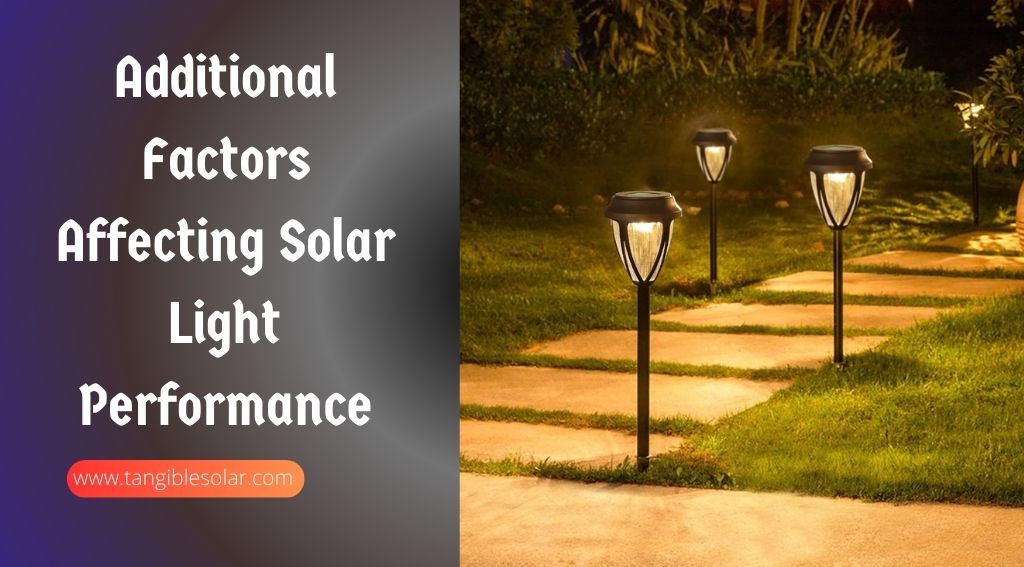
Solar lights are an excellent option for outdoor lighting, offering eco-friendly and cost-effective illumination. However, if you’ve noticed that your solar lights have become dim, there could be a few additional factors affecting their performance. Understanding these factors can help you optimize your solar lights for brighter and more consistent illumination. Let’s explore some key considerations that could be impacting the brightness of your solar lights:
Seasonal Variations In Sunlight Intensity And Duration
One crucial factor influencing the performance of solar lights is seasonal variations in sunlight intensity and duration. As the seasons change, the amount of sunlight that reaches the solar panels can vary. In regions with distinct seasons, this difference can have a noticeable impact on the brightness of the lights. During winter months, for example, shorter days and lower sun angles can result in reduced solar power production. On the other hand, summer months may provide longer days with more direct sunlight, leading to increased solar power generation. It’s important to consider these seasonal variations when assessing the brightness of your solar lights and adjusting their placement accordingly.
Weather Conditions And How They Impact Solar Light Efficiency
Weather conditions play a significant role in the efficiency of solar lights. Cloudy or overcast days can reduce the amount of sunlight that reaches the solar panels, resulting in decreased energy production. Additionally, rain or snow may accumulate on the solar panels, hindering their ability to absorb sunlight effectively. It’s crucial to keep the solar panels clean and free from debris to optimize their performance. Furthermore, extreme temperatures can impact battery life and overall efficiency. In colder conditions, the battery may have reduced capacity, affecting the brightness and runtime of the lights. On the other hand, excessive heat can lead to faster battery degradation. Considering the weather conditions and taking appropriate measures to protect and maintain your solar lights can help ensure consistent brightness.
Upgrading To Higher-quality Solar Lights For Brighter Illumination
If you find your current solar lights consistently dim even under optimal conditions, upgrading to higher-quality solar lights may be the solution. Not all solar lights are created equal, and investing in higher-quality options can provide brighter illumination. Look for solar lights with more efficient solar panels and higher-capacity batteries. Additionally, consider lights with adjustable brightness settings or multiple LEDs to customize the amount of light needed. Upgrading to higher-quality solar lights can significantly enhance the illumination and overall performance, ensuring your outdoor spaces are well-lit and inviting.
The Importance Of Regular Maintenance To Ensure Consistent Brightness
Regular maintenance is essential to keep your solar lights performing at their best. Over time, dirt, dust, and debris can accumulate on the solar panels, reducing their efficiency. It’s crucial to clean the panels periodically to optimize their light absorption. Additionally, make sure the batteries are functioning correctly and replace them when necessary. Some solar lights may also require bulb or LED replacements over time. By conducting regular maintenance checks and addressing any issues promptly, you can ensure consistent brightness from your solar lights, enhancing the overall ambiance and functionality of your outdoor spaces.
Frequently Asked Questions On Why Are My Solar Lights Dim?
How Do I Make My Solar Light Brighter?
To make your solar light brighter, try these tips: 1. Clean the solar panel to improve sunlight absorption. 2. Ensure the light is positioned in direct sunlight for maximum charging. 3. Replace the batteries if they are old or weak.
4. Opt for higher-wattage bulbs if possible. 5. Place the light in a spot with minimal obstructions to maximize brightness.
Why Aren’t My Solar Lights Bright?
Solar lights may not be bright due to several reasons, such as insufficient sunlight exposure, dirty solar panels, low battery levels, or faulty wiring. Start by cleaning the solar panels and ensuring they receive enough sunlight. Check the battery and replace if necessary.
If the problem persists, consult a professional for further inspection.
How Do I Make My Outside Lights Brighter?
To make your outside lights brighter, try the following steps: 1. Clean your light fixtures and bulbs regularly to remove dirt or debris that may dim the brightness. 2. Switch to higher-wattage bulbs or install LED bulbs that provide brighter illumination.
3. Adjust the positioning of your lights to ensure they are aimed properly. 4. Use reflective surfaces or light-colored surroundings to enhance brightness. 5. Consider installing additional lighting fixtures for better overall brightness.
What Determines The Brightness Of Solar Lights?
The brightness of solar lights is determined by the number and power of the LEDs used in the light.
Conclusion
To sum up, understanding the reasons behind dim solar lights is crucial for optimal performance. Issues such as dirty solar panels, insufficient sunlight exposure, or expired batteries may be the culprits. Regular maintenance and cleaning, along with proper placement and battery replacements, can significantly improve the brightness of your solar lights.
Keep these factors in mind to ensure they continue to illuminate your outdoor space effectively.

